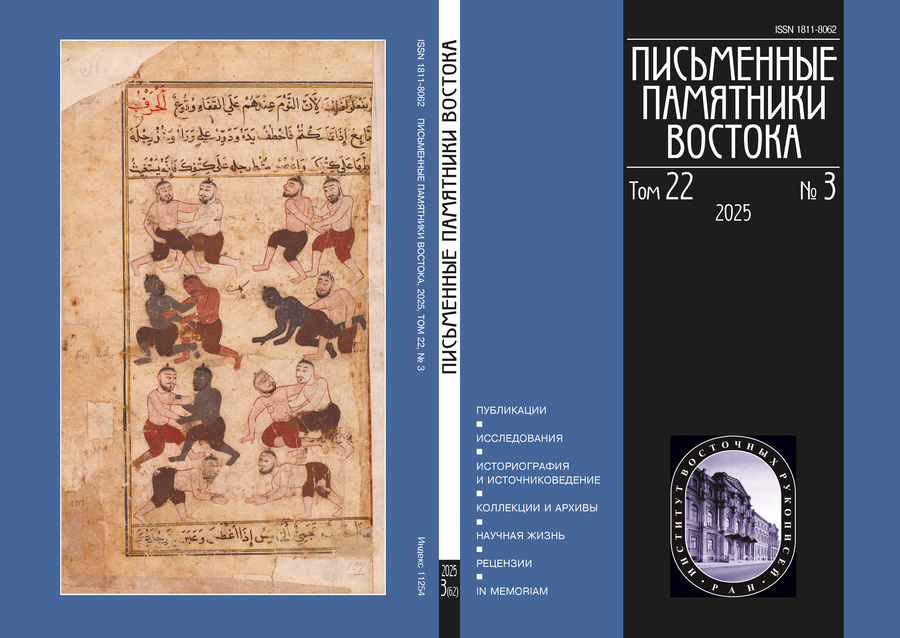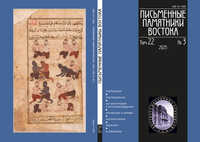Pis'mennye pamiatniki Vostoka
The periodical "Pis'mennye pamiatniki Vostoka" is an international peer-reviewed journal, which is focused on the study of written legacy of Asia. From 1970 till 1987, it was published annually by the Institute of Oriental Manuscripts, Russian Academy of Sciences. In 2004, the IOM, RAS resumed "Pis'mennye pamiatniki Vostoka" as an academic journal; in 2015 the English version of the journal appeared; since 2016 it has been published quarterly.
The main direction of the journal is the study of the manuscripts, early printed editions and archival heritage of the peoples of the Orient, as well as of a wide range of problems in history, philology, source study, historiography, codicology, paleography, epigraphy, textology.
The main topics of the journal are represented by the following headings: "Publications", "Research", "Book Culture", "Collections and Archives", "Restoration and Keeping", "Academic Life", "Reviews". The journal publishes translations of the written monuments of the Orient from the world's manuscript collections, libraries, archives, and museums, as well as various research articles, based on written sources, studying history, literature, religions and culture of the Orient. The Editorial Board accepts articles on the problems of Oriental textology, written monuments, manuscript collections and repositories, problems of manuscript preservation and restoration. Notes on the current academic life events and activity of institutions studying written monuments of the Orient, conferences, research plans, and reviews are also accepted.
The edition is aimed for Orientalists and specialists in various fields of the Oriental studies.
Current Issue
Vol 22, No 3 (2025)
- Year: 2025
- Published: 30.09.2025
- Articles: 12
- URL: https://journals.eco-vector.com/1811-8062/issue/view/13747
Full Issue
Publications
The Siyar as-Suluk by Saуyid Kazim Rashti. A translation from Arabic and Persian. Part 2
Abstract
This article continues the introduced and commented publication of translated works of one of the founders of Shaykhism, Sayyid Kazim Rashti, from the collection of the Institute of Oriental Manuscripts of the Russian Academy of Sciences. The translation of this treatise, rendered for the first time into a European language, has been made from a manuscript and a lithography.
 5-19
5-19


On education in the Yixue Charity School according to the manuscript “The stories of one hundred and twenty old men”
Abstract
This article presents a translation of a story from the original Manchu manuscript titled Emu tangū orin sakda gisun-i sarkiyan, which contains extensive information on the various aspects of bannermen’s routine. It describes the education process in the so-called Charity Schools Yixue 義學, in which a perfect teacher makes the Confucian classics (in particular, the “Four Books” Sishu 四書) clear and instils the Manchu cultural code (Manchu language proficiency and archery) into the students. The story also tells us that discussing the Confucian ideology in Manchu was actively encouraged, which reflects the Qianlong policy on the cultivation of Manchu/bannermen identity.
 20-26
20-26


Research works
Pratyakṣa in Prāsaṅgika: how is sensory perception possible?
Abstract
In the Buddhist Mahāyāna school Madhyamaka-Prāsaṅgika, the possibility of sense perception — one of the two (along with logical inference) instruments of cognition recognized in Buddhism — is under question. If all differences are false, being determined by ignorance that obscures saṃsāric consciousness, then perception appears, at first glance, to be impossible, since there is neither a perceiving subject nor a perceived object. Unlike the Yogācārins, the Prāsaṅgikas exclude the possibility of preverbal perception: it is always conceptually laden with the distinction between the subject and the object. However, in fact, perception is impossible only at the level of absolute reality, while at the level of relative reality it exists — but its object is not so much external objects as the fruits of a person’s karmically significant past actions, appearing as “external” objects. Therefore, the theory of perception in Prāsaṅgika must be viewed not through the prism of the correspondence theory, but through that of the coherence or pragmatic theories of truth.
 27-41
27-41


The traditional Japanese Nihontō sword as a source of inscriptions and texts
Abstract
The Japanese sword Nihontō 日本刀 can be viewed through the prism of traditional culture not only as an edged weapon and a work of applied art, but also as an object of veneration in Shinto and Buddhist cults. It bears sacred meanings and symbols, as well as various inscriptions and texts. The article is devoted to the analysis and systematization of most typical sword inscriptions (mostly on the blade tangs), their structure and the nature of information contained. Such sword inscriptions could be extremely laconic, or quite detailed. Some detailed inscriptions are a kind of literary narrative, including puns and even pieces of poetry. The article analyses a representative selection of inscriptions by several famous Japanese swordsmiths found on the blades in Russian and Japanese museum collections.
 42-58
42-58


“Turkish, Arab and Persian Wrestling” in the military training program of the Mamluks according to manuscript C 686 (IOM RAS collection)
Abstract
This article contains the first Russian translation of the chapter “Turkish, Arab and Persian Wrestling” in the illuminated manuscript on Mamluk warfare copied in AD 1474 and currently housed at the Institute of Oriental Manuscripts of the Russian Academy of Sciences under shelf-mark C 686. The study focuses on the historical context and traditions of wrestling originating from Central Asia and Mongolia. Special terms used in the manuscript, which are loanwords from Persian and Turkic languages, are discussed and interpreted. The author also examines a miniature depicting wrestlers, its style, features, as well as the origins of this artistic tradition.
 59-76
59-76


History and historiography
From the history of the decipherment of West Semitic writing: events and people. VII. Barthélemy the orientalist: between scholarship and high society. Part V
Abstract
The final essay in a series of articles about the events and people who stood at the origins of West Semitic epigraphy in Europe is an overview of the last Orientalist works in the life of Barthélemy in the 60s of the 18th century, his close relations with opponents and the five-year pause in scholarly work, which was the result of the abbot’s friendly solidarity with his disgraced patron, the Duke de Choiseul, who was exiled from Paris to Chanteloup. The Duke’s return to the capital and the subsequent many years of the abbot’s hard work on a multi-volume archaeological novel were crowned with the triumphal march of Anacharsis across Europe on the very eve of the French Revolution, although this triumph did not prevent Barthélemy from perceiving the decline of his life as a “chain of misfortunes” and “the revenge of fate”.
 77-96
77-96


Territorial division of the Tangut State in text tang 824 (Tangut Fund of the IOM RAS)
Abstract
This article is a preliminary study of a text fragment containing historical evidence on the Tangut State’s territorial division. Later, military and administrative structure of this state was to be organized on the principles of this division. As a sample of further intended study, we present a translation and short analysis of two lines of this text that reflect the specifics of territorial and military division of Xixia State during a concrete historical period.
 97-102
97-102


Collections and Archives
“The Brosset Collection”: how the Korean collection of the IOM RAS (Asiatic Museum) began to form
Abstract
The article deals with the history of early acquisitions of Korean books by the Asiatic Museum — namely, nine texts from the so-called “Brosset collection”. This collection includes books from various collectors mentioned in the handwritten catalogue of Chinese, Manchu, multilingual, Japanese and Korean books from the collection of the Asiatic Museum compiled by Academician Marie-Félicité Brosset. The paper centers on the identification of records from this catalogue with books currently kept at the Institute of Oriental Manuscripts, proving their origin from the libraries of Paul Ludwig Schilling von Canstadt and Stepan Vasilievich Lipovtsov on the basis of archival data, and substantiating the assumption that those collectors most likely obtained them from members of the Russian Orthodox Mission in Beijing (including Hyacinth Bichurin).
 103-117
103-117


B. Baradiyn and his travel diaries on Mongolia and Amdo (from the archives of orientalists at the IOM RAS)
Abstract
The article discusses the starting phases of B. Baradiyn’s long expedition to Lavran. His journals that are housed at the Archives of Orientalists at the Institute of Oriental Manuscripts of the Russian Academy of Sciences give an account of all stages of the journey. B. Baradiyn was only 27 years old when he was commissioned by the Russian Committee for Middle and East Asian Studies to travel firstly to Urga and then to the Tangut Buddhist monastery of Lavran. The journal “Amdo-Mongolia” gives a description of Dalai Lama XIII’s visit to Mongolia. Being himself a Buddhist and a scholar, B. Baradiyn considers the positive and negative stages of the development of Buddhism in Mongolia, shares his views on the life of the Mongolians and Tibetans. In addition to entering daily notes about his journeys into his travel journals, B. Baradiyn also described all aspects of life of the local population, including history, geography, economics, politics, etc., in which he was deeply interested.
 118-126
118-126


Academic Life
The 47th Annual Session of St. Petersburg Arabists (St. Petersburg, april 7 and 9, 2025)
 127-132
127-132


Reviews
Review of the book: Nuh al-Meretuqi. Nur al-maqabis fi tawarikh al-charakis. The Glow of Lamps in the History of the Circassians. Ed. by Ilya V. Zaytsev. Maykop: AO “Poligraf-YuG” Publ., 2024. 192 pp. — ISBN 978-5-7992-1170-7 (in Russian).
 133-136
133-136


In memoriam
Mуasnikov Vladimir Stepanovich (1931–2025)
 137-141
137-141













